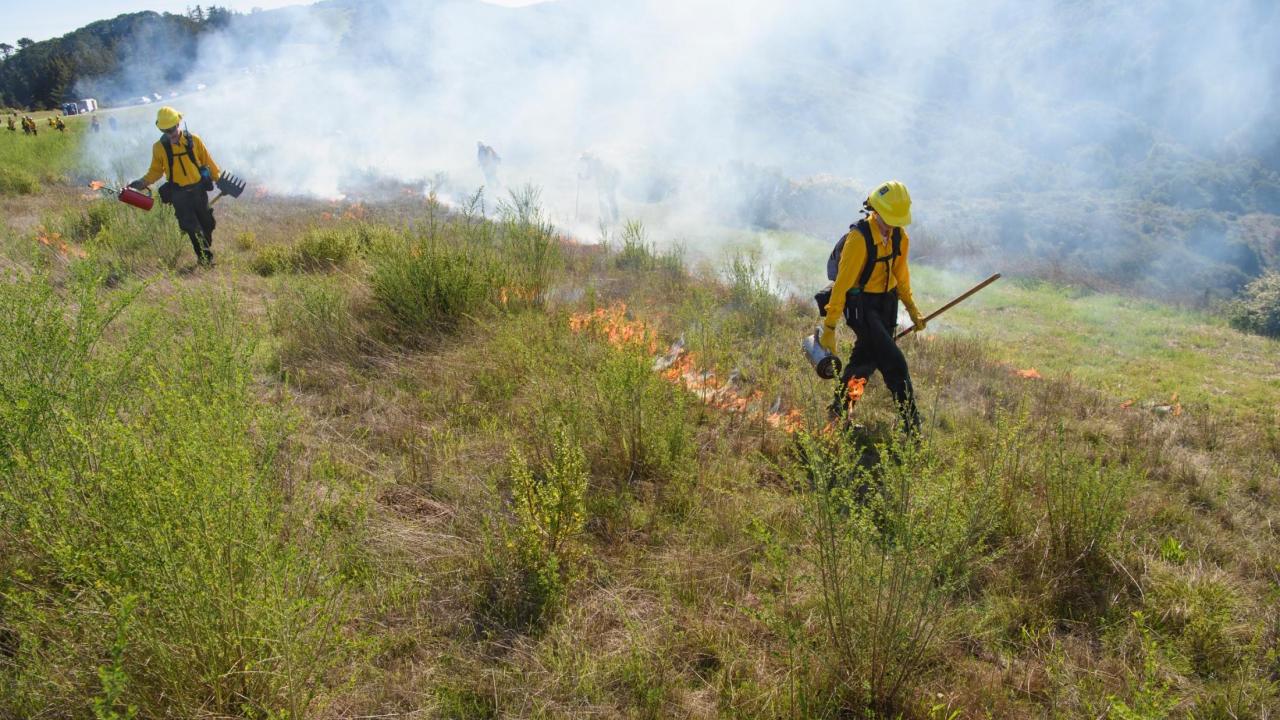
EPM in the Wild - A Case Study Competition
California’s Sierra Nevada communities are under mounting pressure as wildfire disasters increase in intensity and frequency. In a bid to find innovative solutions, the United States Forest Service and Net Impact created the Wildfire Resiliency Competition to ask, “how can we do better?”. Pitching an interdisciplinary community based organization approach, EPM graduate students Natalie Chapman, Katie Michel, Cheryl Winfield, and Angelly Tovar brought home the silver medal!
In Spring of 2022, Natalie came across the Wildfire Resilience case-study Competition created by the United States Forest Service and Net Impact asking students, professionals, and researchers how we can better tackle economic and ecological sustainability in the Sierras. At the time, we were all taking Mark Lubell’s ENV 200C: Environmental Governance. The class required an open-ended final project/paper applying pertinent theories and principles to a real world environmental issue; we thought, “why not team up and kill two birds with one stone?”
Townsville (a fictional town located in the Sierra Nevada mountains) was recently impacted by wildfires (modeled after the recent Dixie fire), and is being granted $200 million dollars to develop wildfire resiliency through economic development and environmental stewardship. How might the city of Townsville invest the $200m grant to best utilize wood waste by-products from forest treatment in order to maximize ecological and economic outcomes?
We used this opportunity to apply our knowledge gained from the EPM program–environmental law (especially from Tracy’s ENV202 class!), management and governance, sustainable business practices, professional pitch development, and public speaking just to name a few. Intentionally designed to incorporate our recent education in environmental governance, our team wove collaborative, adaptive, and governance theories into our pitch and designed our business system to think ahead of governance barriers.
Our idea: a community based organization (Townsville’s CBO), designed to address and improve Townsville’s economic and ecological stewardship. Our pitch used the $200 million grant to develop an oriented standard board (OSB) and wood pellet sawmill, and retrofit schools and public buildings to use the wood pellets for carbon-neutral and cost saving energy. The profits generated from these two projects fed into our community-centered programming: Wood for Good (to support artisans and vocational trade), Community Grazing (to reduce fuels at the local level and support local ag workers), and Regional Attunement (to facilitate coordination with Prescribed Burn Associations, local tribes, NGOs, USFS, CalFIRE, etc.). This closed-loop economic system supported 200 positions directly and another 150 positions indirectly through artisan support, vocational trade training, and connections to prescribed burning and Wildland Firefighter Type 2 certifications. It takes care of the people, the land, and the economy–all while being carbon neutral! What else could you want from a CBO?
Our team brought diverse subject-matter expertise to the interdisciplinary project, fueling our holistic approach: Natalie’s field experience in restoration and wildfire ecology, Katie’s knowledge of climate change and economic analysis, Angelly’s environmental justice and community improvement focus and Cheryl’s engineering and air quality regulation experience.
In full-circle fashion, we ended our last quarter of the 2022 academic year the same way we ended our first quarter: developing a 5-minute pitch and presenting our final product to subject experts and professionals in the field. See the full pitch packet we created!
When the day came to pitch our project to an expert judging panel, we were lauded for our creativity, emphasis on community building, and dedication to people-centered solutions. All our work paid off: our novel application and four months of prep earned us second place in the global competition. And who knows, maybe our ideas and community first spirit will be taken away from the USFS staff, Net Impact, and expert judging panel and make their way into real Townsvilles across the Sierras.
****
We’d like to thank the following EPM affiliates for their direct and indirect support throughout this process:
John Moffat for providing original research on OSB and Sawmill production. Thank you, John! Mark Lubell for his oversight from first run-through to final pitch, and for giving us the impetus to enter the competition. Jessica Penrose for her feedback and for attending the practice pitch session and the final pitch-off event. Jessica Chalfin for her support and attending the final pitch-off event. Sara Ostad and Natalie Kataoka for their astute visual and content feedback.
